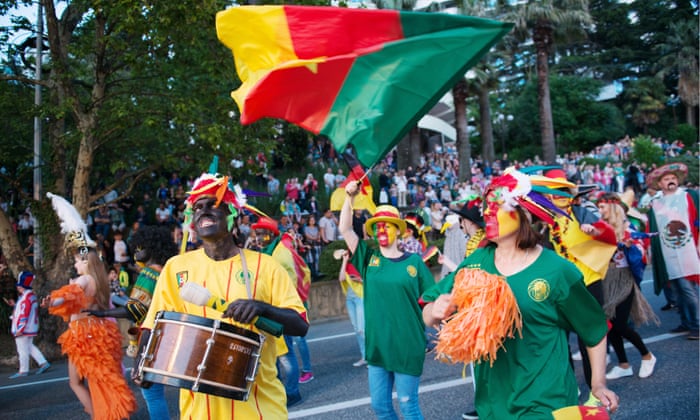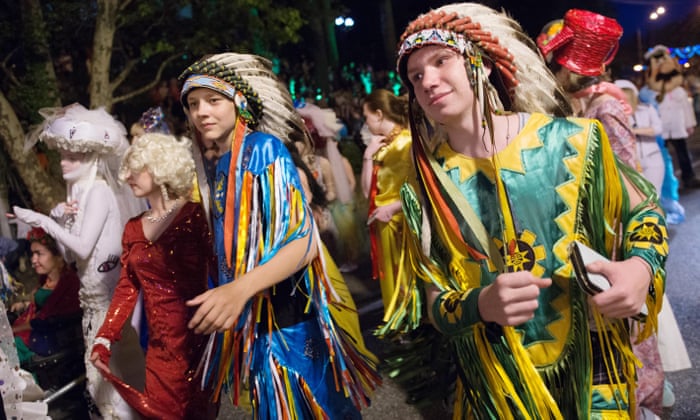Russians parade in blackface ahead of Cameroon-Germany match
Other marchers at Carnaval Sochi Fest parade were seen carrying bananas as city prepares to host Confederations Cup, once more raising racism concerns
Some participants in the Carnaval Sochi Fest 2017 parade wore blackface, while others carried bananas. Photograph: Artur Lebedev/Tass




Participants dressed in ‘bright costumes’. Mexico will play New Zealand at Fisht stadium in Sochi Photograph: Artur Lebedev/TASS
 People in blackface and carrying bananas marched in an official parade in Sochi less than a month before the city hosts Cameroon for a Confederations Cupmatch, once again raising concerns about racism at football matches in Russia.
People in blackface and carrying bananas marched in an official parade in Sochi less than a month before the city hosts Cameroon for a Confederations Cupmatch, once again raising concerns about racism at football matches in Russia.
A photograph from state news agency Tass showed a man in a Cameroon jersey with his face and arms painted black beating a drum at the Carnaval Sochi Fest parade on Saturday. A second man in blackface is visible behind him, wearing an Afro wig and carrying a drum and bananas on a string.
Another man can be seen draped in a Mexican flag, wearing a sombrero and what appears to be a stick-on black mustache. Two young men in a different photograph were wearing what appeared to be Native American headdresses and fringed costumes.
Cameroon will play Germany at Fisht stadium in Sochi, which was built for the 2014 Winter Olympics, on 25 June. Mexico will play New Zealand at the stadium on 21 June.
Sochi’s mayor led more than 3,000 marchers in “bright costumes” down a main street to officially open the southern city’s beach season. The marchers in blackface were part of a section dedicated to the Confederations Cup, which will serve as a dry run for the World Cup that Russia will host next year.
Late on Tuesday, the Sochi city government said in a statement that the parade was a “celebration of the different continents and a testimony of Russia’s open attitude toward traditions from around the globe.”
“By no means did the carnival parade intend to insult anyone,” it said. “On the contrary, it was organized with the friendliest of goals in mind: to create a positive atmosphere. We look forward to warmly welcoming the Cameroon national team and its fans, as well as the representatives of all other countries, during the FIFA Confederations Cup.”
But Russia’s track record of football-related racism has raised questions about whether non-white fans and players will be comfortable at the two huge international football tournaments.
A 2015 report by the Fare network and the Moscow-based Sova Centre for information and analysis documented 99 racist and far-right displays and 21 racially motivated attacks by Russian football fans during the 2012-13 and 2013-14 seasons. In one case, hooligans beat up fans of Anzhi Makhachkala, a club from Russia’s mostly Muslim Caucasus region, outside matches in Moscow and St Petersburg in August 2012.
International players have also been targeted. A banana was thrown at Brazilian left back Roberto Carlos at a match in St Petersburg in 2011, and fans in Moscow held up a banana banner directed at Nigerian striker Peter Odemwingie in 2010.
Zenit St Petersburg’s Brazilian striker Hulk said in 2015 he encounters racism in “almost every game” in Russia, and Ghanaian player Emmanuel Frimpong said he was “racially abused” by the crowd while playing for FC Ufa.
Russia has promised racism will not be an issue at the tournaments it will host, and the Russian Football Union appointed former Chelsea midfielder Alexei Smertin anti-racism and discrimination inspector in February. But even this news didn’t come without controversy, as Smertin had said in 2015 that “there’s no racism in Russia”.
The head of the official Russians supporter group at Euro 2016, Alexander Shprygin, has far-right affiliations and has been photographed performing a Nazi salute. He was among fans detained after violent clashes at the Russia-England match and was later deported.
Lolade Adewuyi, a Nigerian journalist who was present at the Sochi parade, told Associated Press that he didn’t believe the marchers were trying to offend but were simply unaware of the impact of their actions.
